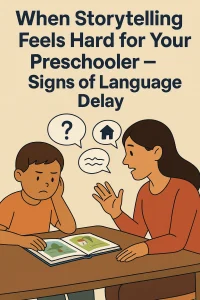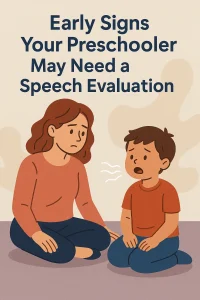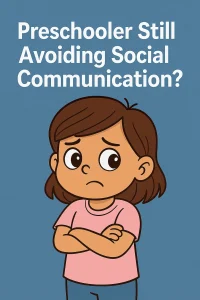Help Kids Speak Clearly: Tips for Parents as Role Models
By Rajini D
Last Updated: December 21, 2024
As parents, you play a crucial role in shaping your child’s ability to communicate clearly. Good speech clarity and articulation are essential for building confidence, social skills, and academic success. The way you speak, model words, and interact with your child sets the foundation for their communication skills. In this article, we’ll explore simple, effective ways to become a speech role model for your child. By making small changes in your daily interactions, you can create a supportive environment that fosters speech clarity, clear articulation, and confident communication. Let’s get started!
The Importance of Articulation in Early Childhood
Clear articulation is more than just a skill—it’s a gateway to effective communication and early childhood development. When children learn to articulate their words clearly, it boosts their ability to communicate their thoughts and needs. This speech clarity not only aids in their learning process but also plays a vital role in social interactions and building self-esteem.
Why is clear articulation crucial? It forms the foundation for future academic success and emotional development. Children who articulate well are often better understood by peers and adults, reducing frustrations and misunderstandings. This enhances their ability to follow instructions and participate more actively in classroom activities, giving them a significant advantage.
To help your child develop clear speech, here are a few simple speech articulation tips:
- Encourage talking: Engage your child in daily conversations.
- Read together: Regular reading can introduce new sounds and rhythms in speech.
- Sing songs: Music helps with rhythm and pronunciation.
- Play pronunciation games: Make learning fun by playing games that focus on articulating specific sounds.
Read More: Speak Clearly and Learn: Master Articulation Skills
How Parents Influence Child’s Speech
The role of parents in a child’s language development cannot be overstated. From the earliest coos and babbles, children learn to speak by mimicking the sounds and patterns they hear most often—those from their parents. This imitation is the cornerstone of language learning and highlights why parental involvement is so critical.
Effective Parent-Child Communication Techniques:
- Talk regularly and clearly: Regular, clear communication with your child exposes them to a wide range of vocabulary and sentence structures.
- Be a good listener: Respond to your child’s attempts to communicate, which reinforces their efforts and encourages further speech.
- Narrate your activities: Describe what you’re doing as you go about daily tasks to introduce new words and concepts.
- Ask open-ended questions: Encourage your child to think and respond more elaborately, which promotes more complex speech patterns.
Strategies for Parents to Model Clear Speech
Helping your child develop clear speech is a rewarding journey that begins with your daily interactions. Here are some practical strategies you can adopt to encourage and improve speech clarity in your kids.
Daily Speaking Practices
To foster a rich language environment, incorporate these tips for parents to improve speech clarity in kids into your everyday routine:
- Model clear speech: Always speak clearly and slowly enough for your child to grasp how sounds and words are formed.
- Expand on their words: When your child speaks, expand on their sentences to model more complex language.
- Create a talk-friendly environment: Dedicate time each day for discussions, storytelling, or sharing about your day, ensuring you use a wide vocabulary and complete sentences.
Daily Practices for Clear Speech
| Strategy | Description | Example |
|---|---|---|
| Model Clear Speech | Speak clearly and use proper enunciation to model how sounds are formed. | Pronounce each word clearly when talking to your child. |
| Expand Language | Build on your child’s words and phrases to model more complex language. | If the child says “dog,” you might respond, “Yes, that’s a big brown dog.” |
| Narrate Daily Activities | Describe what you’re doing as you perform daily tasks to introduce new vocabulary. | “I’m chopping carrots for our dinner soup.” |
| Read Together | Regular reading sessions expose children to new vocabulary and sentence structures. | Read a variety of books that are age-appropriate. |
| Sing Songs | Songs and rhymes improve phonetic awareness and pronunciation. | Sing nursery rhymes and simple songs daily. |
| Pronunciation Games | Play games that encourage the child to practice specific sounds and words. | Play ‘I Spy’ focusing on items beginning with a certain sound. |
Correcting Speech in a Positive Way
Positive reinforcement can make learning more enjoyable and effective for your child. Here are some techniques to guide their speech development:
- Praise efforts, not just accuracy: Celebrate all attempts at speech, even if the words aren’t perfectly articulated, to encourage more attempts and learning.
- Use gentle corrections: Instead of directly correcting mispronunciations, repeat the word correctly within your response. For example, if they say “pasgetti,” you might say, “Yes, I also love spaghetti!”
- Reward progress: Set up a reward system for consistent effort and noticeable improvements in articulation, like a sticker chart or extra storytime.
Engaging in Articulation Exercises with Your Child
Practicing specific pronunciation tips for parents can dramatically help children who struggle with certain sounds:
- Articulation games: Turn practice into play with games focused on target sounds, like ‘I spy’ for sounds (“I spy something that starts with /b/”) or memory games with words that have specific sounds.
- Practice with mirrors: Sit with your child in front of a mirror and practice making sounds together. This allows them to see how their mouth moves.
- Sing songs and nursery rhymes: Songs that emphasize different sounds or rhymes help children practice articulation in a fun, engaging way.
Common Articulation Challenges and How to Address Them
Articulation challenges are not uncommon in early childhood, but recognizing and addressing them early can make a significant difference in your child’s communication skills. Let’s explore how to identify these issues and determine when it might be time to seek professional help.
Identifying Articulation Issues
Recognizing early signs of articulation issues is crucial for timely intervention. Here are some signs that your child might need help with speech clarity:
- Repeating Sounds or Syllables: Children often repeat sounds or syllables as they learn to speak. However, frequent repetition might indicate a struggle with articulation.
- Omitting Sounds: Skipping sounds in words, like saying “nana” instead of “banana,” can be a sign of articulation difficulties.
- Distorting Sounds: If your child consistently changes sounds, such as saying “wadio” instead of “radio,” this might be a sign of articulation challenges.
- Substituting One Sound for Another: Common substitutions like using “t” for “k” (e.g., “tar” for “car”) can indicate a problem.
Conclusion
As we’ve seen, your role in modeling clear speech is crucial for your child’s development. Every story read, conversation had, and game played together helps enhance their articulation. Remember, this journey is ongoing and full of opportunities to support and encourage your child’s communication skills. Continue exploring and learning with our resources at Wellness Hub. We offer tools and advice to make speech practice both fun and effective. Keep the conversations lively and the learning active—your dedication is shaping your child’s future success in communication. Let’s keep going strong together!
Frequently Asked Questions:
1. What age should a child start speaking clearly?
Most children begin to speak clearly by age 3 to 4. Each child develops at their own pace, but if your child is still struggling with clear speech by the age of four, it might be worth seeking advice from a professional.
2. How can I tell if my child has articulation problems?
Signs of articulation problems include difficulties pronouncing vowels, skipping consonants at the beginnings or ends of words, and challenges in blending sounds smoothly. If your child consistently makes these errors, they may benefit from speech therapy.
3. What are some simple activities to improve my child’s articulation?
Engage your child in playful activities like ‘I Spy’ where they practice specific sounds, sing songs to develop rhythm and pronunciation, and tell stories that emphasize different sounds. These fun activities can help improve their articulation without feeling like work.
4. How often should I practice speech exercises with my child?
Aim for daily practice, which can be broken into short sessions of 5-10 minutes each. Consistency is key in speech development, so even brief, regular practice can lead to noticeable improvements.
5. Can watching TV help my child articulate better?
While educational TV shows can introduce new words, active interaction and speaking practice are much more effective for developing articulation skills. Encourage activities that involve back-and-forth conversation to practice speaking clearly.
6. What should I do if there’s no improvement in my child’s speech?
If your child’s speech doesn’t seem to improve despite regular practice at home, it might be helpful to consult a speech-language pathologist. They can provide professional assessment and tailored exercises suited to your child’s specific needs.
7. Are there specific books to help with speech clarity for children?
Yes, books that focus on phonics and repetitive sound patterns can be very helpful. Look for books designed for early readers that emphasize phonetic awareness and repetition of challenging sounds.
8. How do I correct my child’s speech without discouraging them?
Use positive reinforcement techniques. For instance, if your child mispronounces a word, repeat the word correctly within your response and praise their effort. This encourages them without making them feel criticized.
9. What role does music play in speech articulation?
Music is a powerful tool for enhancing phonetic awareness and improving rhythm, both of which are essential for clear speech. Songs and rhymes make learning new sounds fun and engaging, helping children practice articulation in a joyful way.
10. When should I start reading to my child to help with articulation?
It’s never too early to start reading to your child. Reading from infancy helps with sound recognition and early word formation. As they grow, continue reading more complex stories to challenge their understanding and speech.
About the Author:
Rajini Darugupally
M.Sc., Speech-Language Pathologist (9+ years of experience)
Rajini is a passionate and dedicated Speech-Language Pathologist with over 9+ years of experience, specializing in both developmental speech and language disorders in children and rehabilitation in adults. Currently, at Wellness Hub, she thrives in a team environment that values innovation, compassion, and achieving results for their clients.
Book your Free Consultation Today
Parent/Caregiver Info:
Client’s Details:
* Error Message









